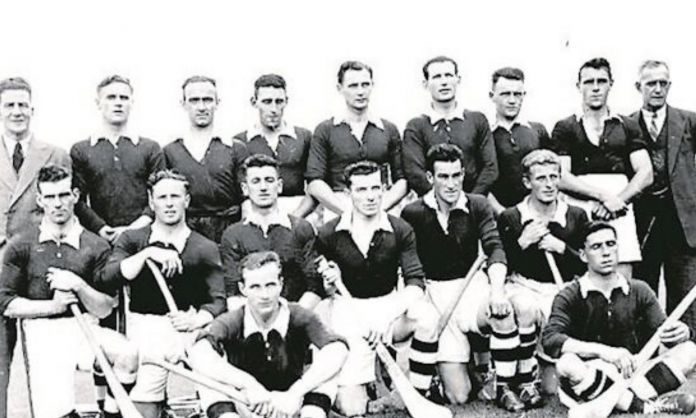By Sean Ryan
When one thinks of playing sport during a pandemic the mind immediately focuses on the current nightmare GAA supporters have had to endure because of the Covid-19 pandemic. However, Ireland has been here several times before and 80 years ago is one that springs to mind.
In that year several counties were beset with the Foot and Mouth disease and so movement outside of these was forbidden. In that year the GAA steadfastly refused to move to alter its All-Ireland fixture schedule. The upshot of it was in an era before backdoors were ever invented in the GAA, Cork won the hurling All-Ireland Hurling Final and their Munster colleagues Tipperary won the delayed Munster Hurling Final later that year.
Indeed Tipperary was particularly affected with Foot and Mouth. First identified in February 1941, the disease was largely concentrated in the South Leinster and Munster, leading to the slaughter of between 21,000 and 24,000 animals, and most seriously affected Kilkenny, Carlow, and parts of Laois and Tipperary. Compared to today, there were obvious environmental factors helping contain the epidemic.

Wartime travelling restrictions were in force and private motoring was virtually unknown and in most counties outside of the capital was exceptionally sparse. It was certainly a precursor to local lockdowns as buses, trains, and taxis, where available, and bicycles were the primary means of transport. This resulted in a scenario where there were no major movements of population and consequently the dangers of the disease spreading were much reduced.
Noted GAA historian Seamus King, a native of Tipperary, looking back at the 1941 outbreak revealed that “Racing and the public sale of horses had been banned as early as March in 1941. The North Tipperary County Council wrote a letter to the Minister for Agriculture Dr. James Ryan (FF) in April calling for greater restrictions on many sporting events which had not been cancelled. Minister Ryan, great grandfather of the current Leinster Rugby forward of the same name, replied that he “did not want to interfere with people’s enjoyment, but it was up to the council to make representations to the promoters of events”.
Looking back at the records in May of that year there were 11 outbreaks in County Tipperary. King recalls, causing creameries and schools been ordered to close, and “the first mention of the cancellation of GAA matches. All games scheduled for Littleton, Moyne and Carrick-on-Suir for May 18th 1941 were called off.
There was a meeting of the Tipperary county board of the GAA on May 20th and it was decided to stop all county matches. No teams were to leave the county. Indeed, in the week before the fixture was to take place, there were 41 outbreaks of foot-and-mouth in Ballingarry in South Tipperary. There was a request to the Munster Council to postpone the Waterford-Tipperary senior hurling championship game.
On May 31st, 14 more cases were reported. The game, a first-round tie, scheduled for Thurles on June 1st , was postponed and eventually played on the last Sunday in July. Tipperary won by 4-7 to 3-4. They were to play Cork in the Munster semi-final at Limerick on August 17th but the match was called off the previous Monday by order of the Department of Agriculture.”
Tipperary and other counties which were affected wanted the GAA’s central council to delay the All-Ireland hurling final but the GAA refused. The council ruled that teams be nominated and if a nominated team won the All-Ireland that team would be awarded the 1941 championship. This led to Cork being nominated to represent Munster after a specially convened match between Cork and Limerick which Cork won and Dublin representing Leinster, the two sides duly meeting in the All-Ireland hurling final with the Cork men emerging victorious.
By October of 1941 the vast amount of Foot and Mouth restrictions in Ireland had eased and the 1941 Munster hurling final was played on October 26th. Cork had brought a strong line-up to Limerick with a future Taoiseach Jack Lynch lining out at Midfield and hurling legend Christy Ring at wing forward.
Tipperary probably with a point to prove beat Cork 5-4 to 2-5 at the Gaelic Grounds in Limerick. While many said that Cork were not as up for the game as Tipperary, the Tipperary captain that day the late Johnny Ryan from the Moycarkey-Borris club maintained that was “an excellent Cork team and one that was to go on and win four in a row” only for Tipperary to put a halt to their gallop in 1945.
1941 will always be remembered for a pandemic which played havoc with the country’s GAA fixture list while also been a precursor to the GAA’s famous ‘backdoor’ (formally introduced in 1997) where a team could be All-Ireland champions but not provincial champions. They say history repeats itself and certainly 1941 despite been 80 years ago will live long in the memory of GAA supporters most particularly in Tipperary!
TIPPERARY: Jimmy Maher, Denis O’Gorman, Ger Cornally, Tom Hayes, Johnny Ryan (Captain), John Maher, Tommy Doyle, Bill O’Donnell, Neil Condon, Mutt Ryan, James Heaney, Peader Flanagan, Jim Ryan, Tommy Treacy & Jer Looby.
CORK: J Buttimer, B Murphy, B Thornhill, A Lotty, B Campbell, C Cotrell, Dj Buckley, J Barrett, J Lynch, C Ring, c Buckley, J Young, J Quirke, T O’Sullivan & M Brennan.








